Breaking: Autopsy reveals how Cyrus Jirongo died
Faces of resilience amid Covid-19
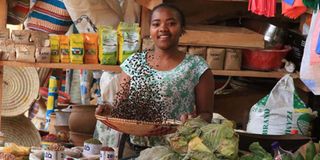
Agnes Njeri, a grocery seller at Mudavadi market in Nyeri County. The Covid-19 pandemic hit her hard and after days of struggling, she reached out to her customers and started delivering goods to their homes.
They are often excluded from decisions that affect their daily lives, but the rural woman plays an important role in the economy. They are farmers, miners, entrepreneurs and caretakers of their families, including food provision and care for children and the elderly.
International Day of Rural Women 2020 gives us a chance to celebrate these women playing a key role and their impact that extends to the urban areas through food security, agriculture and nutrition. Food and Agriculture Organisation (FAO) says they produce up to 70 per cent of the food grown on small farms.
The realities of Covid-19 have only exacerbated these disparities. In line with this year’s theme coming at a time the world is fighting a pandemic, there is need to build their resilience by strengthening their sustainable livelihoods.
They have been at the frontline of responding to Covid-19 even as their unpaid care and domestic work increased under lockdowns, restricted mobility and disrupted supply chains. During the pandemic, their self-help groups have produced masks and liquid soap for hand washing, provided fresh food even to urban dwellers, and communicated vital Covid-19 information in their communities.
Cheers to the women who feed the nation.
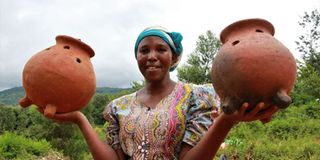
Elizabeth Wavinya with some of the clay brooders she makes at her home in Kasola Village in Makueni County. She is among a handful of women in the rural farming community who went on making the chic warmers, pots and assorted clay items as the world battled the the Covid-19 pandemic.
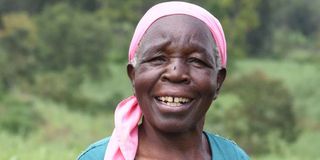
Beatrice Muhati from Malava in Kakamega County, adhered to the government guidelines on Covid-19 during the pandemic. She stayed at home, kept social distance, washed her hands and used a face mask whenever necessary. She also ensured the grandchildren she lives with followed the guidelines.
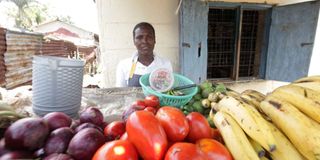
Aquiline Okwemba Owino, 26, at her business station in Nyalenda, Kisumu County. Covid-19 made her life and that of her family difficult. The daily sales at her grocery business declined drastically. She had to adjust the family daily meals from three to two because her husband also lost his job. Since the Covid-19 restrictions were eased, however, life has started normalising and she hopes for better days ahead.
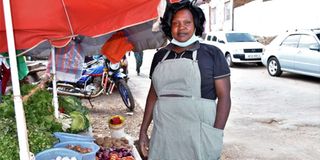
Janet Katumbi Kimeu, a green grocer in Meru County suffered a lot during the Covid-19 lockdown. Her sales dwindled because most of her customers are hotels, which were all shut. She, however, adhered to health regulations and survived on the little savings she had. With the reopening of the economy, business is picking up and now she can afford to put food on the table.
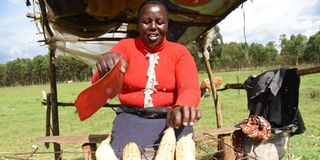
Joan Jepleting, 32, has sold roast maize at King’wal in Nandi County, on the Eldoret-Kapsabet Road for the last 10 years. The Covid-19 pandemic was a major blow to her after she was asked to stop in mid-March to prevent the spread of the virus. She opted to planting maize in her small farm in April, which she later harvested for roasting in August and September after coronavirus guidelines were eased.
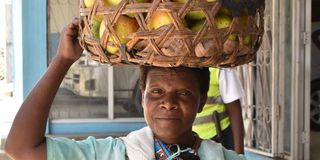
Kabibi Kalume from Tudor, Mombasa County hawks mangoes within Mombasa town - baby on her back. She has sold coconut and mangoes for the last 20 years. With Covid-19, sourcing for the products at Kongowea Market became difficult as prices shot up, but she managed to pull through with a few shillings.
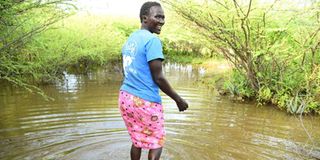
Lonah Lemaitano is a fish harvester at Noosukuro, in Lake Baringo, Baringo County. She lost a lot of business during the Covid-19 peak period as there was no market for her fish. To survive, she used a motorbike to deliver fish to her clients.
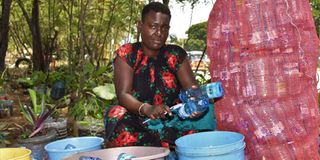
Bahati Mpa Mwadime from Mshomoroni, Mombasa County lost her job as a house manager when Covid-19 struck. She opted to collect and recycle plastic bottles for a living. This has helped her sustain her daily needs.
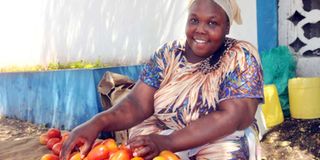
AfDB has approved a five-year strategy promising to bolster women's economic growth through a $5 billion credit access. Photo | Nation Media Group
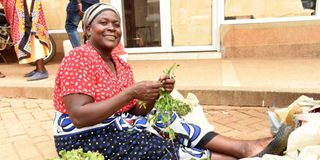
Sarah Mangala from Kakamega County sells vegetables for a living. In the wake of Covid-19, she adhered to Ministry of Health guidelines -washing hands with soap, using face mask and keeping social distance whenever handling a client. During the curfew, she delivered vegetables to her regular customers. Most of them made orders on phone and paid her via mobile money transfer- M-pesa.
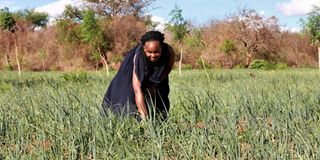
Grace Kitavi at her onion farm in Kisayani Village in Kitui County. The secondary school teacher decide to grow the high value vegetable during the Covid-19 pandemic when schools were closed.

Janet Katumbi Kimeu, a green grocer in Meru County suffered a lot during the Covid-19 lockdown. Her sales dwindled because most of her customers are hotels, which were all shut. She, however, adhered to health regulations and survived on the little savings she had. With the reopening of the economy, business is picking up and now she can afford to put food on the table.
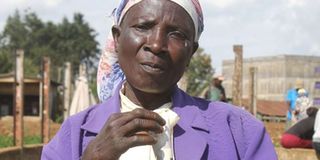
Maryanne Atieno Ojwang' sorts groundnuts she sells in Elburgon, Nakuru County. Ms Atieno has done this business for the last 30 years, a venture that has enabled her pay rent and educate her children. Her income drastically dropped during the pandemic since many people lost their jobs and could not support her any more.
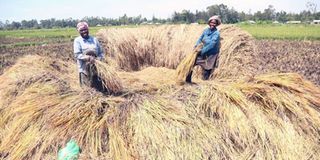
Philgona Anyango Ochieng’, 55, (left) and Susan Ouma ,48 at a rice farm in West Kano irrigation scheme in Ahero, Kisumu County where they earn a living. The women, mother of five and four respectively, earn a daily wage of Sh600 doing what is locally known as Dino Mchele, the manual removal of rice husks. The husks are then packed in sacks and transported to mills for drying and milling.



